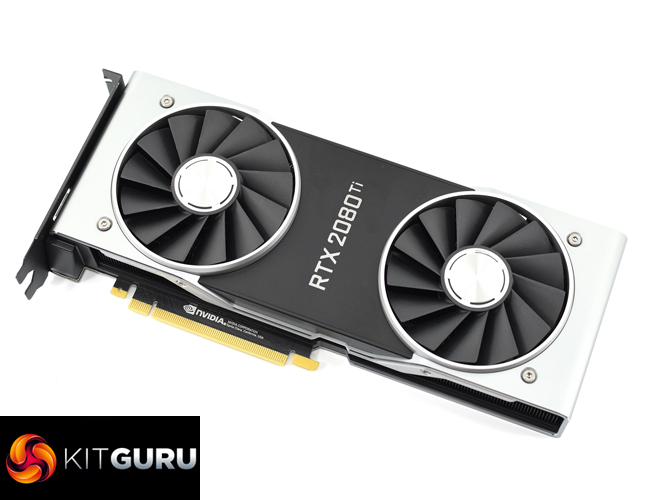We have just published a review of the RTX 2080 today, but this specific review has focused on the more expensive flagship RTX 2080 Ti Founders Edition. At £1,100 it is a heck of an investment but as the Nvidia webpage shows at time of publication, it's already sold out on pre-order.
Starting with Nvidia's reference design, this Founders card is simply a showcase of stellar engineering. We saw the GPU core peak at just 73C which made us double-take – previous Nvidia reference designs would run as hot as the temperature limit was set, so to see the RTX 2080 Ti come in so cool is great to see. We have to say the decision to add a full-length vapour chamber and ditch the blower-style fan in favour of two axial fans has paid off massively.
These changes make a significant difference with noise levels as well – aside from the RTX 2080, this card is the quietest reference board we have ever tested, with its noise levels peaking at just 42dB.
With the premium design as well – plenty of aluminium is used, which gives the card a quality feel – I would not be surprised to see the market for cheaper cards from board partners shrink drastically. After all, so far we've only seen one card that is actually cheaper than the Founders Edition RTX 2080 Ti, so expect more and more people to be buying Founders cards this generation.
Our card also overclocked very well, as we were able to increase its clock speed from barely 1700MHz to 1891MHz which remained consistent under load. It's not as far as we could push the RTX 2080, but this is still hugely impressive and gained us an extra 9% performance when playing Far Cry 5 at 4K.
Moving onto real-world game testing, it's pretty easy to summarise what you are getting with the RTX 2080 Ti – it is the fastest single graphics card we have ever tested. Compared to the GTX 1080 Ti, for instance, it performs on average 28% faster at 1440p, while this rises to 33% at 4K where the 2080 Ti can really stretch its legs.
Obviously there is a significant price difference between those two cards – the 1080 Ti costs £669 directly from Nvidia, where the 2080 Ti is £1099, making it £430 more expensive. That's a 64% price hike generation to generation.
We could sit here and argue all day about this – obviously the increased price does not match up with the increased performance in games (right now anyway as no games yet support ray tracing). Then again, people who want the best, most powerful graphics card will pay for it. In any case, matters aren't helped by the fact that Nvidia simply has no competition in this sector – AMD doesn't have anything that comes close to touching the RTX 2080 Ti in terms of real-world gaming performance.
Then there's also the small matter of ray tracing – the key feature of the new Turing cards. As we mentioned at the start of this review, we are unable to test real-time ray tracing in games until Microsoft releases its DirectX Raytracing (DXR) update which is coming next month.
We were provided with a ray tracing demo from Nvidia, however, and you can see that in action on the RTX cards back on page 12 of this review. What that demo shows us is the RTX 2080 Ti outperforming the GTX 1080 Ti by up to 780% when it comes to real-time ray tracing. Of course, this is just one demo, so we can't say how this will translate to games that use a hybrid method of rendering – combining both elements of ray tracing with rasterisation. What we can say, however, is that Turing wipes the floor with Pascal in regards to ray tracing capabilities.
Deep Learning Super Sampling (DLSS) is another feature that is new to Turing. This again is dependent on games supporting it before we can test it fully, but we were provided an early-access demo of Final Fantasy XV that showed DLSS providing an increase of 34% to average FPS, when compared to TAA. To our eyes, DLSS also looks superior in terms of visual fidelity.
To wrap ray tracing and DLSS together, we do need to wait to see how actual games you can play will leverage these technologies. There is a long list of games set to support DLSS, while ray tracing will also make its way into blockbuster titles including Battlefield V and Metro Exodus. The trouble is, we just can't say how the RTX 2080 Ti will perform with those games until we can actually test them.
Even if we put that to one side, the RTX 2080 Ti still has the benefit of being the fastest single card we have ever tested – so if you want to eke out every last frame from your games and don't care about the cost, this card will be for you regardless of its ray tracing abilities.
Many people will want to wait and see how the card perform with ray tracing in games, however, and we will bring as much coverage of that as we can. For now, though, we can say that the ray tracing aspect is very promising, while you also get a hefty improvement to your frame rates versus the GTX 1080 Ti. Just be willing to part with £1,099 for the pleasure.

You can buy the Nvidia RTX 2080 Ti directly from Nvidia for £1099. Overclockers UK also has a range of aftermarket cards starting at £1049.00.
Pros
- Fastest single card we've ever tested.
- Founders Edition runs very cool.
- Noise levels are also hugely impressive.
- Overclocking yielded significant performance gains.
- Ray tracing with the RTX 2080 Ti looks promising.
- DLSS is another Turing-specific feature that has us excited.
Cons
- Very expensive at £1099.
- We are yet to see how ray tracing and DLSS translates to actual games you can play at home.
KitGuru says: It may be very expensive, but the RTX 2080 Ti does offer the best performance we've seen from a single card. We will also have to see about its real-world ray tracing ability, but it looks promising.
 KitGuru KitGuru.net – Tech News | Hardware News | Hardware Reviews | IOS | Mobile | Gaming | Graphics Cards
KitGuru KitGuru.net – Tech News | Hardware News | Hardware Reviews | IOS | Mobile | Gaming | Graphics Cards




